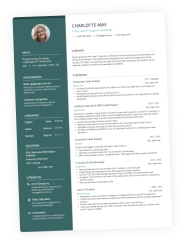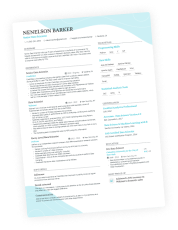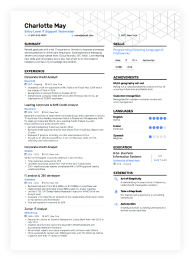Recent graduate? Maybe trying to break into a new industry? Don’t worry.
Everyone starts with the same amount of professional experience – precisely zero. Including relevant courses on your CV is a great way to sidestep a lack of real-world experience.
But before you add reams of coursework, think about your career stage, the role you're pursuing, and the match between your education and the job requirements. The right info makes the difference between a great CV and fluff.
So we’ve put this article together to help you decide whether to include your relevant coursework on your CV - and show you how!
In this article, we:
- Describe how coursework can give you a leg up when you’re starting out
- Take you step by step through how to add your coursework to your CV
- Explain when you might not want to
- And for each one, you get examples of how to write your own!
Why include courses?
Including relevant courses on your CV is a powerful tool for communicating your skills and knowledge to potential employers. It can give you a competitive edge in situations where your educational background plays a substantial role in your suitability for the job – for an internship or an educational role, for example.
It can be particularly beneficial if you're a recent graduate or changing careers and lack extensive work experience in your target industry. Including relevant coursework shows you have at least theoretical and maybe practical experience, which can help if you don’t have much or even any professional work experience in your field yet.
Besides that, including relevant coursework showcases your commitment to learning and your dedication to acquiring the necessary skills for the job. Showing you've invested time and effort in developing the knowledge needed to excel in your chosen field can give you an edge over other candidates.
If you have a year or more of experience in your field, though, it’s likely that you don’t need to include individual classes you’ve taken. Your professional experience will be of greater interest to an employer in most cases.
And then, for some jobs, coursework won't be considered important at all. For example, cashier or wait staff positions don’t generally require specific courses.
However, it can be worth including if you’ve taken specialised training that applies for a position, perhaps as a sommelier if you serve in fine dining. But for these roles, including your technical skills and work experience can sometimes be a better choice.
Determine relevance
Assessing the relevance of your coursework for a job application is essential for tailoring your CV effectively. The following steps offer a clear and effective method to gauge which coursework is relevant to your job application.
High-level overview
Start by closely examining the job or course description, highlighting the key skills, qualifications, and knowledge areas it requires. You can use this list along the way as a reference.
Drill down
Next, pay attention to the keywords and phrases in the job or course description indicating what the employer is seeking. Compare these keywords to the courses you've taken and see where they align.
Also, consider the core competencies needed for the position, which are often listed in the qualifications or skills section. Match and include relevant courses that meet those requirements.
Watch the clock
Staying up to date with industry trends is also crucial. Particular coursework may gain prominence as the field develops. Highlight coursework that reflects that.
Review and reach out
If you’re unsure about something, don't hesitate to seek advice from professors, mentors, or professionals in the industry. Insights from people in your network can be invaluable in identifying which courses align best with your career goals.
Be specific
Remember to tailor your CV for each application, giving more prominence to the courses that directly relate to the job or course you're applying for. Use the same keywords and phrases from the job or course description in your CV to make strong connections.
Time it all
While recent coursework is generally more relevant, don’t overlook older coursework if it’s directly related to the job or course. Ensure a balance between foundational and specialised coursework, showcasing a well-rounded knowledge base.
Make it relevant
Incorporate certifications and short courses related to the field alongside your coursework to strengthen your qualifications. It's essential to be honest and transparent, only including coursework you've completed or are currently undertaking. Your CV should accurately represent your level of expertise in each subject.
Highlight key courses
In most cases, you will not list all the courses you took. You won’t have the room, and they’re unlikely to all be valuable for a particular position.
Prioritise and emphasise the most important courses. For example, you can place the most important ones at the top of the list.
Course information
The formatting and listing of your relevant coursework should be clear and concise. And you also have to consider how much space you have.
If you don’t have much room, you may be limited to listing the course, where you took it, and when. If you have more room, you can add other details to sell yourself to a recruiter better.
Let’s go through a structured format that showcases your qualifications and makes it easy for potential employers or institutions to understand your educational background and achievements.
Titles
To start, you can either place relevant coursework under a subheading in the education section of your CV or create a dedicated section for it. Either way, this is where you’ll list the course titles that directly relate to the job or course you're applying for.
But remember, if the job description indicates you need a specific course, keep it separate from your education section. This will keep it from getting lost in the mix when the hiring manager reviews your CV.
You only need to list the names of your courses. The internal numbering system – like Psych101 – may not be familiar to the recruiter, and it could be distracting for them.
Use bullet point format to make it easily scannable.
Institutions
After each course title, include the name of the institution where you completed the coursework. This adds credibility to your qualifications.
Dates
Finally, specify the dates when you took these courses. Mention the month and year, or simply the year, depending on the space available.
These examples show how you might start:
Relevant Courses
- Marketing Research Methods - University of XYZ (Jan 2021 - May 2021)
- Data Analysis for Business - ABC College (Fall 2020)
- Financial Accounting - DEF University (2019)
Notable achievements and grades
If you achieved exceptional results or had notable accomplishments in any of these courses, it's worth mentioning them. Use a concise and impactful style to highlight these achievements.
Example:
- Marketing Research Methods - London School of Economics (Jan 2021 - May 2021)
- Achieved 97%, the highest grade in the class for the final research project.
- Data Analysis for Business - Imperial College (Fall 2020)
- Recognised for outstanding data visualisation skills.
- Financial Accounting – University of Bristol (2019)
- Received a commendation for consistently high marks.
Course Descriptions
Alternatively, consider including a brief description of the course content or what you learned if you have room. Especially if the essential skills learned aren’t evident from the course title.
For example, if database management is listed as a requirement for a job and you learned that as part of the Data Analysis for Business course above, a recruiter might not recognise it. Add a line below the course title describing the skill to clarify its relevance.
- Data Analysis for Business - Imperial College (Fall 2020)
- Developed strong database management skills through course research projects.
Including majors, minors, GPAs, and thesis/dissertation titles.
When crafting your coursework section, you can also present your majors and minors by listing the degree you pursued, such as "Bachelor of Arts in History with a Minor in Political Science." Include your classification or GPA if it enhances your profile, placing it near your educational details.
Likewise, you can highlight relevant thesis or dissertation titles, emphasising their significance and aligning them with the targeted position. Use concise language, such as
- Thesis: Exploring Institutions in Contemporary Politics
Like with other listings, you could add a short sentence to clarify its relevance if it isn’t obvious.
Additional certifications and qualifications
Consider including certifications or qualifications acquired through coursework to highlight a specific skill set or expertise. List each certification's relevant details, including the issuing institution and completion date.
For instance, if you completed a Digital Marketing Certification at the University of Edinburgh, describe it with details like:
- Digital Marketing Certification, University of Edinburgh, April 2025
Licenses or credentials
Some industries demand practitioners earn and maintain one or more licenses or other credentials. Ensure potential employers easily recognise your value by detailing each credential with specifics like the issuing body, license number, and expiration date.
For instance, if you completed a Health and Safety Executive (HSE) certification, specify it with details such as:
- HSE Certification in Workplace Safety (License No: 32Te9, Expiry: 08/2026)
Online courses and MOOCs
Online courses and MOOCs are increasingly acceptable and popular for staying competitive in today's job market. When adding them to your CV, include them like any other coursework, listing courses with titles, platforms, and completion dates and highlighting specific skills gained or notable achievements.
As an example, a content creator with a focus on digital marketing might include:
- Digital Marketing Fundamentals Course, Coursera, June 2025
- Acquired strong SEO optimisation and social media strategy skills
- Developed a comprehensive digital marketing plan during the course, demonstrating practical application and adding tangible value to skills gained.
Language courses
Our interconnected world has placed a premium on language skills. Establishing your capacity in other languages can enhance your versatility and marketability across various fields.
To do this, create an entry listing any language courses you’ve taken with their respective proficiency levels. For example, if you've completed a "Spanish for Business" course, indicate your proficiency as "Intermediate."
Like this:
- Spanish for Business Course, University of Edinburgh, May 2022
- Proficiency Level: Intermediate.
When to gloss over your coursework
The decision to include relevant coursework on your CV should be thoughtful. Including relevant coursework on your CV is a strategic choice, but there are situations where it might be advisable to gloss over this section:
Extensive professional experience
Suppose your work history is extensive and directly related to the job you're applying for. In that case, your coursework may become less prominent – or nonexistent. In this case, employers will often prioritise your practical experience over academic achievements.
Irrelevant or outdated courses
Be selective. If you've taken courses that are no longer relevant to your field or the position, omitting them can declutter your CV.
Focus on coursework that maintains its relevance.
Information overload
A CV with an exhaustive list of coursework can overwhelm readers. It's crucial to strike a balance by emphasising key courses that align most closely with the job while keeping the document concise and easy to navigate.
Job doesn't require it
Certain positions may place less emphasis on academic qualifications and prioritise other aspects. In cases like this, even relevant coursework may not be a central focus in the hiring process.
Length constraints
Suppose your CV is approaching an excessive length for your industry. In that case, you might need to condense your relevant coursework to accommodate other sections.
Applying for diverse roles
Tailoring your CV for diverse fields or roles may involve streamlining your relevant coursework. Focus on universally applicable courses to create a CV that's more easily adaptable for different job applications.
Overqualification
Avoid including coursework that significantly exceeds the requirements of the job. Omitting overqualified coursework is wise to prevent the perception of being overqualified, which can lead to employers assuming you'll be dissatisfied or costly to hire.
Alternatives to coursework
Don’t get so caught up in demonstrating your qualifications through coursework that you overlook other valuable information you can offer a potential employer.
Even if you have no work experience in your industry, there are options. And some can be more valuable than coursework.
Volunteer experience
Incorporating volunteer experience on a CV can often be more impactful than including coursework because it demonstrates practical application of skills in real-world scenarios. It also showcases your commitment, adaptability, and contribution to the community or a cause.
Whereas coursework focuses on theoretical knowledge, volunteer experience establishes your interpersonal skills, leadership qualities, and the positive impact you can bring to a team or organisation. This practical exposure tends to resonate more with employers, highlighting your ability to apply your skills beyond academics.
Extracurricular activities
Including extracurricular activities on your CV can demonstrate your real-world application of skills, teamwork, and personal initiative. Extracurriculars prove your versatility and commitment beyond academic achievements, making you a well-rounded candidate.
Projects
Projects on your CV can sometimes be more impactful than coursework because they demonstrate practical skills and tangible results. You can include projects on your CV to illustrate your hands-on experience and problem-solving abilities, giving employers concrete evidence of your capabilities.
Passion, strengths, or interests
Finally, adding your passions and strengths to your CV injects personality and makes it more engaging. Unlike coursework details, this section humanises your CV, offering a glimpse into your unique qualities for potential employers.
Formatting tips
When incorporating a coursework section into your CV, prioritise a clean and easy-to-read format. Opt for a clear layout with distinct sections, using bullet points for each course alongside your education or in a dedicated section.
Maintain a consistent font and formatting style throughout the document, ensuring recruiters can quickly grasp your educational background and coursework details. A visually appealing and well-organised CV enhances readability and leaves a positive impression on potential employers.
Proofreading and Editing
In the coursework section of your CV, meticulous proofreading is paramount to convey professionalism and attention to detail. Eliminate errors by thoroughly reviewing each entry for accuracy in course names, institutions, and completion dates.
Use proofreading tools like Grammarly or Microsoft Word's spell-check feature to catch spelling and grammar mistakes. Additionally, consider seeking feedback from a trusted network member or use the "read aloud" method to identify overlooked errors.
A flawlessly edited coursework section showcases your commitment to precision. It ensures your CV leaves a positive and error-free impression on potential employers.
Takeaways
- You don’t always need to list coursework on your CV and should only choose the most relevant courses.
- Including coursework may be helpful if you’re a recent graduate with no work experience or are entering a new field.
- After a year of work experience, in most cases, listing what you’ve accomplished will be a better option.
- Use consistent, clear formatting.
- A separate coursework section is a good option if the job requires a specific course or is education-specific.
- Except where specified, alternatives like volunteer experience can impress a recruiter as much or even more.



